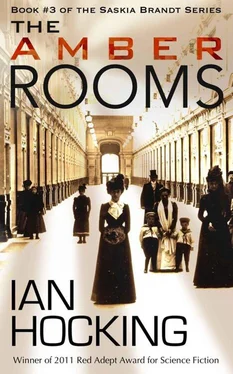‘What are you doing?’ he said, taking her wrists.
Saskia stared at her hands as Pasha removed them from his cheeks. She looked at the veins and the sudden bumps of her tendons as she rippled her fingers.
‘Ms Tucholsky, you will come with me.’
She ignored him. She made fists, then put her palms together in prayer, watching the whiteness where the fingers pressed. Pasha did not release her.
‘Ms Tucholsky?’
‘My hands,’ she whispered. ‘How could I not notice until now?’
‘Never mind your hands. Ms Tucholsky, there has been a breakin at the palace this evening and we must account for your presence.’
Saskia decided that her hands were perfect in their symmetry. She looked for the long-forgotten mole on the palm of the left one, not far from the life line. It was there. As, for this body, it had always been.
Pasha took her upper arm. He leaned into her vision and said, ‘Enough. My corporal witnessed you enter the palace along with two men. Clearly, the three of you quarrelled. They abandoned you here and escaped with stolen property. I was surprised to see you, but when I consider the events of the last few months, everything makes sense.’
‘Which events?’
Pasha gave her a disappointed look. He turned towards the door and pulled her arm. ‘You will come along.’
Saskia considered him. He was off-balance and tense. She fell into step as he walked her. At the door to the enfilade, she barged him with her hip. Pasha was heavier but she had tuned her movement to precision, and she had the surprise. He stumbled and released her arm. She watched him turn back—his mouth twisting down in irritation—and she lifted her forearm, which provided an unconscious cue to grip her wrist. He did so. Saskia trapped his hand against her wrist and, using the remainder of his turning energy, and a little of her own, steered his arm in a windmilling action. Pasha’s elbow rose until his hand had passed over his head and come to rest against his shoulder-blade. He gasped and teetered on the balls of his feet. His cheek was against the door jamb.
‘What are you doing?’
‘Quiet, Pasha.’
Still holding him, Saskia sniffed the fingertips of her left hand once more. She had it: Guerlain’s fragrance Mouchoir de Monsieur , favoured by Count Nakhimov.
‘Don’t call me Pasha.’
‘Where is your weapon?’ she asked.
‘It is within the armoury, woman,’ he whispered, as though embarrassed. ‘Where else?’
‘Get it. Then come with me.’
‘Why would I do that?’
‘Your father is in danger.’
He stopped struggling. ‘Danger? What do you know?’
‘I was with him this evening. He helped organise the breakin.’
Pasha stopped struggling. He regarded her with total horror. In that moment, as he looked at her blank expression, and she watched him, each understood that Saskia had told the truth. It had been a weighted guess on her part. For him, she reasoned, it resolved certain ambiguities in his father’s behaviour, or spoke to a truth that he had always known.
‘I will tell you everything,’ she said, ‘but only if you arrange my immediate escape from the palace.’
‘Father is truly in danger?’
‘He is.’
~
Saskia was crouching in the shadow of a staircase on the side of the palace that faced the square. Between the chimes of countless clocks, which reached her through the windows above, she heard the calls and footfalls of palace staff and, beyond them, the greater confusion of the night: shouts, horses at a trot, and alarm bells. It would not take long to mobilise the troops in the barracks around the Tsar’s Village. In the meantime, police carriages had stopped at the main entrance to the palace, and its other entrances, to deploy uniformed and plain-clothes men. The confusion did not diminish. Lanterns were dropped and subordinates cursed. Saskia caught rumours of a full-scale social revolutionary attack on the palace; of chemical gas released into the Grand Enfilade by crack German troops; of an explosion within the Amber Room itself, melting the resin to burning pools. In the blackness next to the external staircase, Saskia listened to the night and its signatures. Meanwhile, she continued her whispered conversation with Ego, which was itself a confusion: the computer did not trust her and would not speak plainly in answer to her questions.
Those questions were gears that ground teeth-in-teeth. Why could Ego not talk directly to her brain, as it had done before? Another guess: because her mind was different; the encryption was undone. Why had the time band sent her to different versions of the Amber Room instead of moving her through time? Because she had been a fool to assume that the countdown had been sent by a friend. Why wasn’t she wearing the band now? Because this Saskia had not used it to travel in time; or the revolutionaries had stolen it.
‘The date,’ she said. ‘At least tell me that.’
‘I must repeat that I will provide as much help as I can, consistent with my confidence in your identity. To help you fully would constitute a risk to the mission. At present, I cannot be sure that you are Saskia Brandt.’
‘I am certainly Saskia Brandt,’ she whispered. ‘My problem is that I am one of many.’
‘The connectome of the neural network is quite different, taking the standpoint of a Euclidean distance metric, from the identifying connectome of your network that I sampled earlier this evening. In short, you are not Saskia.’
In the quietness, Saskia tried to work through the implications of her voyaging mind. She could not. Though her knowledge of physics was thorough, no theory, from 2023 or before, could explain how a malfunction in the dark band would usher her through a brief series of experiences: the soldier in the Amber Room from World War Two; the flight deck of DF323; and her time in Tiflis.
What did those moments have in common? What was there to learn? In each, Saskia had felt a growing sense of control. She had lost her sense of futility. If each moment was drawn from a universe parallel to her own—that was, a universe in which she did not come to save David Proctor—then she was freed from the bounds of her paradox. The future of that alternative universe would be unknown to her. She could have choice. Since her first experience of time travel, her will had struggled beneath the weight of the notion that certain effects had occurred; it was her duty to speak her line at the place and hour appointed.
What if the malfunctioning band had freed her from that constraint? She could act. She could do good and claim the goodness.
A second thought cooled her excitement: if she had no choice in her original universe, who said she had choice in this one? Its future must still be constrained by its past. The difference, if one existed, was that its future was inscrutable.
‘Ego, the quantum entanglement event you spoke of earlier coincided with my awareness that I had transferred to this universe. Isn’t it possible that the quantum event and this transfer are linked?’
‘Put your glasses on.’
Frowning, Saskia took the tinted glasses from her collar. Their frames were thin and the arms tipped with ivory. She put them on and her world became yellow. Shapes were immediately clearer as though the dawn had risen.
‘I’m wearing them,’ she said. ‘Now what?’
‘You will find the technology useful.’
Saskia remembered wearing smart glasses during her first investigation for the FIB. They had responded to her blinks.
She blinked twice. Nothing happened. She tried a slow, single blink. When she opened her eyes, geometric shapes and text filled her vision. The overlap was stable on the real world. It did not move with her eyes. The geometric shapes looked like those triangles and dashes that were painted on runways to help pilots judge distance and speed. The shapes painted the side of the Summer Palace and the frontage visible between her and the far wall of the square. Other polygons targeted objects: trees, doors, and people. Beneath these polygons were trivial data, such as the genus of the tree, but also more important information such as whether a door was locked, and whether a soldier was moving away or towards her. As Saskia looked around this blazing constellation of information, the shapes and text juddered to match the scene. There was a date floating near the corner of her eye. As she struggled to focus on it, the date grew larger: 1st January, 1970.
Читать дальше












